1970s
Pleasure Levers
Our pleasure levers are 19 years overdue!From Selected Readings in Genetic Engineering and Bioethics (1974):
Such experiments lead Herman Kahn of the Hudson Institute to predict that by the year 2000, people will be able to wear chest consoles with ten levers wired to the brain’s pleasure centers. Fantasies Kahn: “Any two consenting adults might play their consoles together. Just imagine all the possible combinations: ‘Have you ever tried ten and five together?” couples would ask. Or, ‘How about one and one”’ But I don’t think you should play your own console; that would be depraved.”

Los Angeles Times - Jan 29, 1970
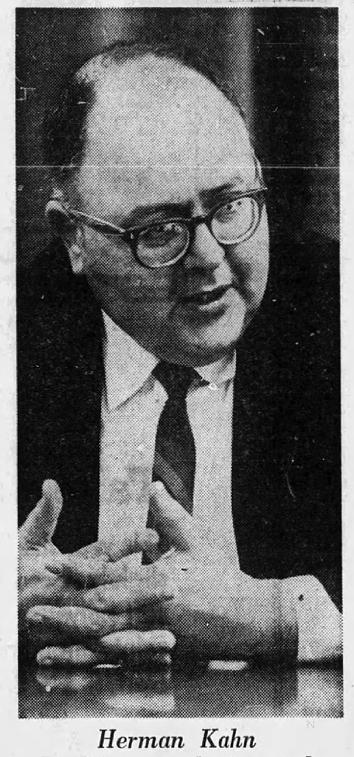
The Hackensack Record - Jan 30, 1970

San Francisco Examiner - Feb 8, 1970
Posted By: Alex - Tue Mar 12, 2019 -
Comments (3)
Category: 1970s, Yesterday’s Tomorrows
Murphy the Molar
A talking tooth from Canada.More info: Lorne Park Dental
Posted By: Alex - Fri Mar 08, 2019 -
Comments (3)
Category: Video, 1970s, Teeth
Follies of the Madmen #416
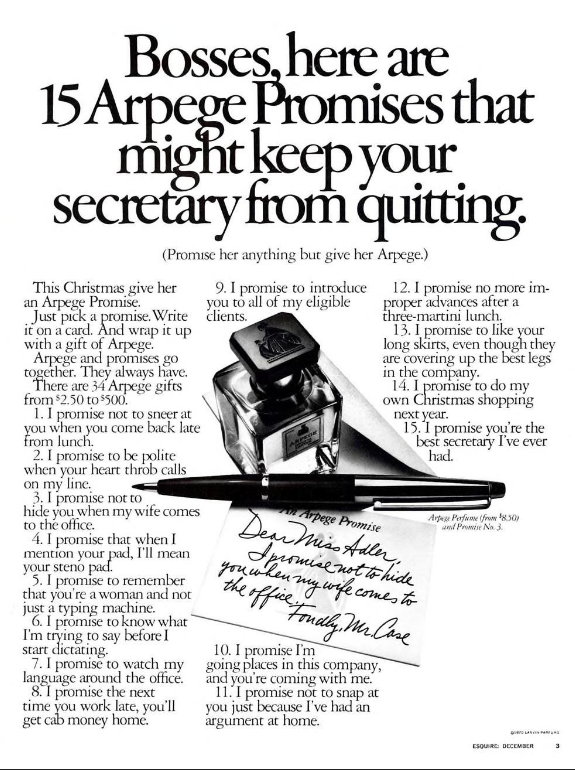
Source.
Posted By: Paul - Thu Mar 07, 2019 -
Comments (0)
Category: Business, Advertising, Sexuality, Perfume and Other Scents, 1970s
Lady Fishbourne’s Complete Guide to Better Table Manners
Lady Fishbourne's Complete Guide to Better Table Manners, Janet Perlman, provided by the National Film Board of Canada
Posted By: Paul - Tue Mar 05, 2019 -
Comments (1)
Category: Antisocial Activities, Culture and Civilization, Customs, Etiquette and Formal Behavior, 1970s
Fox Style
Posted By: Paul - Sat Mar 02, 2019 -
Comments (0)
Category: Ethnic Groupings, Movies, Exploitation and Grindhouse, 1970s
Hardee’s Road Runner and Ernie
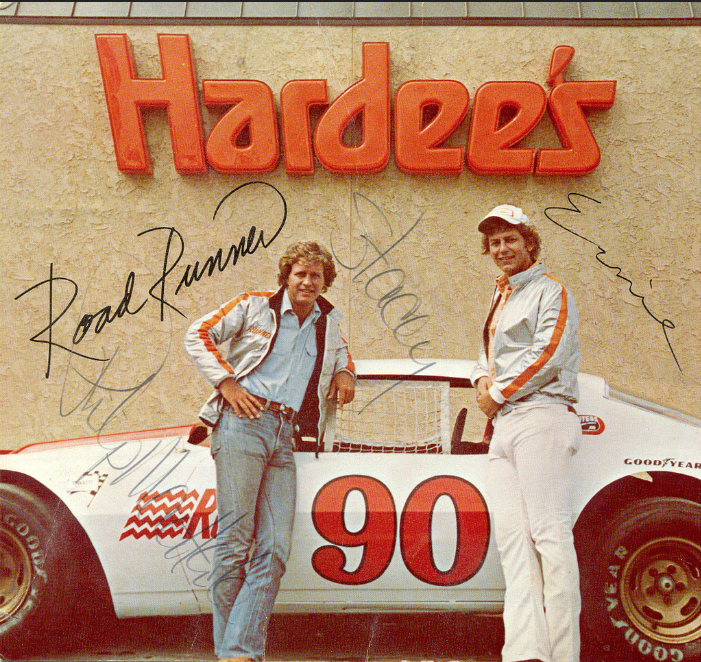
Two lame-o's seeking to capitalize on SMOKEY AND THE BANDIT popularity are employed to endorse burgers.
Many, many more Hardee's commercials here.
Posted By: Paul - Sun Feb 24, 2019 -
Comments (2)
Category: Business, Advertising, Fads, Stereotypes and Cliches, Junk Food, 1970s, Cars
Toast as a unit of power
Odd units of measurement: Back in 1975, Allan Clemow of Tufts University figured out how to translate power consumption into pieces of toast. By his estimate, one kilowatt hour was equivalent to toasting 60 slices of bread. Therefore:- Ironing for an hour = 68 slices of toast
- Watching TV for 4 hours = 100 slices of toast
- Blow-drying your hair for 10 minutes = 4 slices of toast
- Drying a large load of clothes = 270 slices of toast
These estimates may all now have changed thanks to more energy-efficient appliances.

Casper Star Tribune - Nov 20, 1975
Posted By: Alex - Fri Feb 22, 2019 -
Comments (1)
Category: Food, 1970s, Power Generation
New Vietnam
Back in 1975, Rev. Carl McIntire had the idea of bringing the Vietnam experience back to America by building a Vietnam theme park (to be called 'New Vietnam') in Florida, near Cape Canaveral. Needless to say, the idea didn't go over well. Some details:Adjacent to the village will be a rectangular special forces camp encircled by a moat and guarded by machine gun nests, punji stakes and fatigue-clad "soldiers" hired from the county. Inside will be a war museum of Viet Cong and American memorabilia.

Orlando Sentinel - Sep 11, 1975 (click to enlarge)

Philadelphia Daily News - Jun 12, 1975
Posted By: Alex - Thu Feb 21, 2019 -
Comments (0)
Category: Fairs, Amusement Parks, and Resorts, War, 1970s
Knee Reading
Toni Lockhart, aka Gypsy Rose Knee, pioneered the art of knee reading. She detailed her technique in her 1975 book Gypsy's Basic Knee Reader. A few pointers:A new mole may indicate that the person’s life and profession are on the upswing.
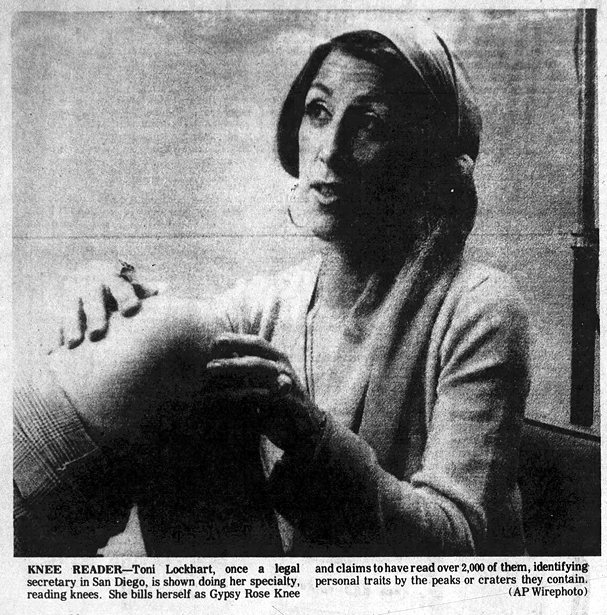
Manhattan Mercury - Aug 8, 1975
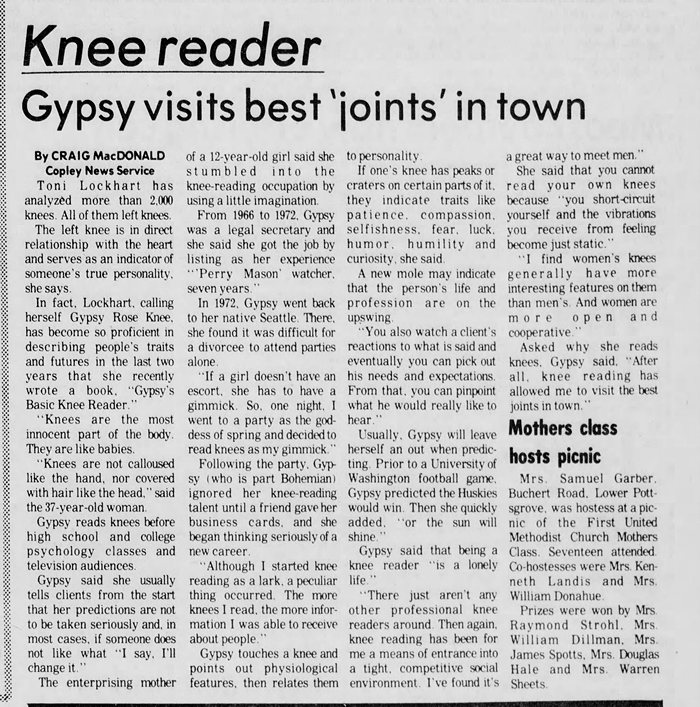
The Pottstown Mercury - Aug 19, 1975 (click to enlarge)
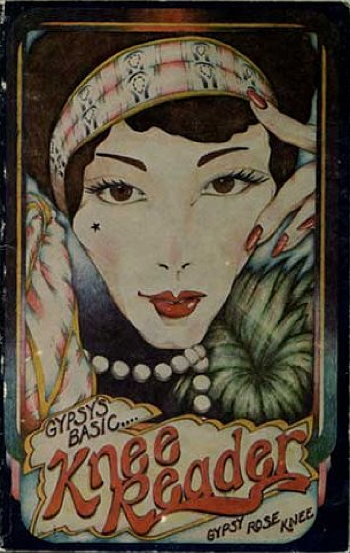
Posted By: Alex - Thu Feb 14, 2019 -
Comments (2)
Category: Predictions, 1970s
Prince Leonard Casley, RIP

Full article here.
Wikipedia page.
Posted By: Paul - Thu Feb 14, 2019 -
Comments (0)
Category: Eccentrics, Curmudgeons and Contrarianism, Government, Unauthorized Dwellings, Outsider Art, Performance Art, Foreign Customs, Obituaries, 1970s

| Who We Are |
|---|
| Alex Boese Alex is the creator and curator of the Museum of Hoaxes. He's also the author of various weird, non-fiction, science-themed books such as Elephants on Acid and Psychedelic Apes. Paul Di Filippo Paul has been paid to put weird ideas into fictional form for over thirty years, in his career as a noted science fiction writer. He has recently begun blogging on many curious topics with three fellow writers at The Inferior 4+1. Contact Us |




